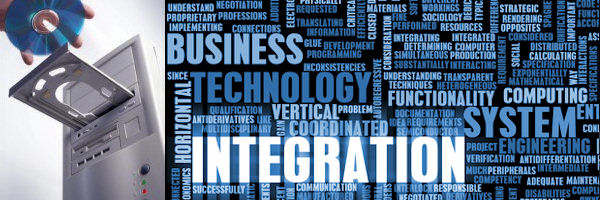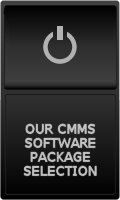 CMMS Systems Integration
CMMS Systems Integration
Integrating your CMMS or Maintenance Management System with inventory, accounting, purchasing systems and other enterprise management systems may be necessary in your organisation.
In larger companies Enterprise Asset Management systems (EAMs) like SAP and J.D. Edwards may already include a CMMS module integrated within the larger system. In smaller companies this integration may have to be organised as a separate function of two or more specific software systems.
If considering this you must bear in mind that it may not be easy to successfully integrate the CMMS without skilled IT people. Unless you have the IT resources available in house it may involve the employment of two or more external software agencies with the resulting financial overheads. Some examples of CMMS/Accounting system integration are provided below.
What is CMMS Systems Integration?
 CMMS software integration (or for that matter any software systems integration)
is the process of enabling two or more software systems to interact with each
other by making common data available to each and facilitating the
exchange of this data between the systems. The data exchange can involve
each system reading the other's data, writing to it or both.
CMMS software integration (or for that matter any software systems integration)
is the process of enabling two or more software systems to interact with each
other by making common data available to each and facilitating the
exchange of this data between the systems. The data exchange can involve
each system reading the other's data, writing to it or both.
An obvious example is the integration of the CMMS with a purchasing system. Most companies already have a purchasing system but almost all CMMS systems now come with their own. In all but the smallest companies the accounts and purchasing departments will already have their own financial, purchasing and inventory systems in place and they will not accept any move to the CMMS purchasing system.
The maintenance department (via the CMMS) may require that the availability of spare parts is checked before planned maintenance work orders are issued. To do this the CMMS software must be able to check the stock levels in the existing inventory software system. The systems integration in this case would mean making the spare parts database fields in the purchasing system readable by the CMMS software.
It may also involve making the fields of the database writeable by the CMMS software in a situation where it is to be allowed to adjust spare parts inventory.
Accounting Systems Integration with the CMMS
The above scenario describes a situation where the CMMS system requires information held in a separate inventory system. There may also be a requirement for the accounting system to read or "pull" data from the CMMS system.
Let's say that the accounting system needs to calculate the overall cost of maintenance work for the general ledger. To do so it will need to have information like how many hours were spent on a job, the cost of materials used and perhaps the cost of any equipment downtime involved. Most modern CMMS systems will be able to provide this information. The actual systems integration will require the software integrator to make the requisite data in the CMMS database readable by the accounting system.
CMMS Software Integration with Third Party Systems
Modern stock control systems often include functionality that allows integration with vendors' systems. This facilitates the automatic placement of orders to the appropriate vendor when stock levels reach the pre-defined minimum.
 Clearly
this is a good solution since it does not rely on any human input. The
chance of error is therefore minimised.
Clearly
this is a good solution since it does not rely on any human input. The
chance of error is therefore minimised.
It also reduces labour costs since there is no requirement for purchasing people to spend time manually raising the purchase orders. In systems where the CMMS is to be used for purchasing there may be a requirement for direct integration with the vendors' systems.
Other potential integration opportunities exist with shop floor data systems and SCADA applications. Shop floor data systems in a manufacturing organisation can offer data on production schedules and the availability of equipment for maintenance. Maintenance work orders can then be planned based on this information. SCADA software can deliver signals indicating the status of equipment or systems and corrective work orders can be raised based on the data received.
So in essence software systems integration just means the exchange of data or making data from two or more systems available to the other(s).
Problems with CMMS Systems Integration
Essentially, systems integration requires people with the required IT skills to make the links between the databases of the systems. This can only be done on open databases. These are databases within software applications that have been programmed to allow access from other applications that are suitable for integration and that permit the required data transfer.
When the system has been properly integrated it should work seamlessly with no errors but problems may arise in future if one of the software applications is upgraded or changed to a new version. The potential for problems in this area clearly increases with the number of systems that are included in the CMMS system integration but the company making the change will generally assist by providing information for any modifications that become necessary as a result of the change.





